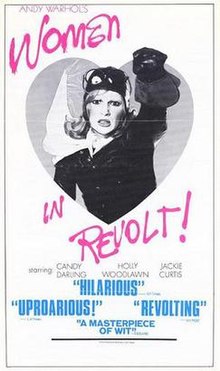Women in Revolt
| Women in Revolt | |
|---|---|
 Theatrical release poster | |
| Directed by | Paul Morrissey |
| Written by | Paul Morrissey |
| Produced by | Andy Warhol |
| Starring | Candy Darling Jackie Curtis Holly Woodlawn |
| Cinematography | |
| Edited by | Paul Morrissey |
| Music by | John Cale |
Release dates |
|
Running time | 97 minutes |
| Country | United States |
| Language | English |
Women in Revolt is a 1971 American satirical film produced by Andy Warhol and directed by Paul Morrissey.[1] It was initially released as Andy Warhol's Women. The film stars Jackie Curtis, Candy Darling, and Holly Woodlawn, three trans women and superstars of Warhol's Factory scene.[2] It also features soundtrack music by John Cale.[3]
Plot
[edit]The film satirizes the Women's Liberation Movement, and alludes to Valerie Solanas and the SCUM Manifesto.[4] Holly and Jackie form a small group of "women's libbers." They convince Candy, a wealthy socialite who has an incestuous relationship with her brother, to join them at their meetings. The group needs Candy's membership to bring money and "glamour" to their cause.
Cast
[edit]- Candy Darling as Candy
- Jackie Curtis as Jackie
- Holly Woodlawn as Holly
- Paul Kilb as Jackie's First Boyfriend
- Jonathan Kramer as Journalist
- Michael Sklar as Max Morris
- Maurice Braddell as Candy's Father
- George Abagnalo as Photographer
- Johnny Kemper as Johnny Minute
- Martin Kove as Marty (as Marty Cove)
- Frank Cavestani as Construction Worker
- Jane Forth as Jane
- Penny Arcade as Penny
Production
[edit]Working titles for the film were P.I.G.S. (for "Politically Involved GirlS") and Sex, which could have been an homage to actress Mae West who was arrested for her play Sex in 1926.[5]
Bob Colacello, former editor of Warhol's Interview magazine, stated, "Although Paul didn't come out and say it, and Andy certainly would have denied it, Women in Revolt is essentially Andy's revenge on Valerie Solanas. PIGs was his answer to SCUM."[6]
Shooting began for Women in Revolt in the spring of 1970.[6] During production from 1970 to 1971, Jackie Curtis insisted that Warhol shoot the film, or she threatened to leave the project.[citation needed]
Warhol and his boyfriend Jed Johnson worked together as the cinematographers.[6] Morrissey is credited as the writer for the film, but Johnson told After Dark in 1970 that the dialogue for their films were improvised.[7] "A lot of people ask if we have a working script on our movies because the dialogue is so clever … what happens, as usual, is that Paul Morrissey gives a sentence to the actors and has them improvising on a topic while the camera is rolling," he said.[7]
Release
[edit]The film premiered as Sex at Grauman's Chinese Theatre as part of the first Los Angeles International Film Exposition (Filmex) in Hollywood on November 6, 1971.[8][9]
The film was retitled Andy Warhol's Women when it opened at the Cinema Theater in Los Angeles on December 17, 1971.[10] It was renamed Women in Revolt by the time it opened at the Cine Malibu in New York City on February 16, 1972.[1]
Reception
[edit]The film received mostly favorable reviews.
Chuck Emerson wrote for the University of Redlands student publication, The Bulldog: "Sex is technically better than Warhol's previous epics … Everything is a joke, a put-on, there's no malice or cynicism in Warhol's intent. Sex, like most of Warhol's stuff, has a curious innocence in its blatant crudeness."[11]
Kevin Thomas wrote for the Los Angeles Times that Warhol fans would find the film "uproarious" and likened it to a spoof of a "'Valley of the Dolls'-type plot."[10]
Vincent Canby of The New York Times wrote, "'Women in Revolt' … is not as consistently funny (and awful) as 'Trash,' but a lot of it is as hilarious as it is dirty. The film carries no screenplay credit, so I have no idea who is responsible for the dialogue, which often is foolish and occasionally inspired in the way that good parodies must be."[1]
Jeanne Miller of the San Francisco Examiner called it a "trashy little stag film," and added Warhol's "performers are so grotesque, his technical skills so non-existent and his sensibilities' so vulgar that not an iota of amusement merges from this sordid farce."[12]
See also
[edit]References
[edit]- ^ a b c Canby, Vincent (1972-02-17). "Warhol's 'Women in Revolt,' Madcap Soap Opera". The New York Times. ISSN 0362-4331. Retrieved 2023-04-30.
- ^ McLeod, Kembrew (October 22, 2018). "The Genderqueer Tale of "Take a Walk on the Wild Side"'s Jackie Curtis". New York. Retrieved August 22, 2020.
- ^ Ghrist, Taylor (November 24, 2015). "Happy Birthday, Candy Darling! Her 5 Most Iconic Moments". Out. Retrieved August 22, 2020.
- ^ Pyne, Mollie (July 14, 2017). "Women in Revolt, Andy Warhol's Satire on Women's Liberation". Another Magazine. Retrieved August 22, 2020.
- ^ Wrbican, Matt; Gopnik, Blake; Printz, Neil (2019-01-01). A is for Archive: Warhol's World from A to Z. Yale University Press. p. 273. ISBN 978-0-300-23344-5.
- ^ a b c Carr, Cynthia (2024-03-19). Candy Darling: Dreamer, Icon, Superstar. Farrar, Straus and Giroux. ISBN 978-1-250-06636-7.
- ^ a b Zaden, Craig (December 1970). "Factory Brothers". After Dark: 22–25.
- ^ Thomas, Kevin (1971-11-05). "Filmex Today". The Los Angeles Times. pp. Part lV 13. Retrieved 2024-05-25.
- ^ Thomas, Kevin (1971-11-05). "First Hollywood International Film Festival Begins". The Los Angeles Times. p. 3. Retrieved 2024-05-24.
- ^ a b Thomas, Kevin (December 18, 1971). "Warhol's Pop-Eyes Look at Lib". The Los Angeles Times. p. 51. Retrieved 2024-03-31.
- ^ Emerson, Chuck (1971-11-12). "LA Film Expo Provocative". The Bulldog. p. 4. Retrieved 2024-05-24.
- ^ Miller, Jeanne (1972-03-25). "Andy Warhol Is Still Revolting". The San Francisco Examiner. p. 10. Retrieved 2024-03-31.
